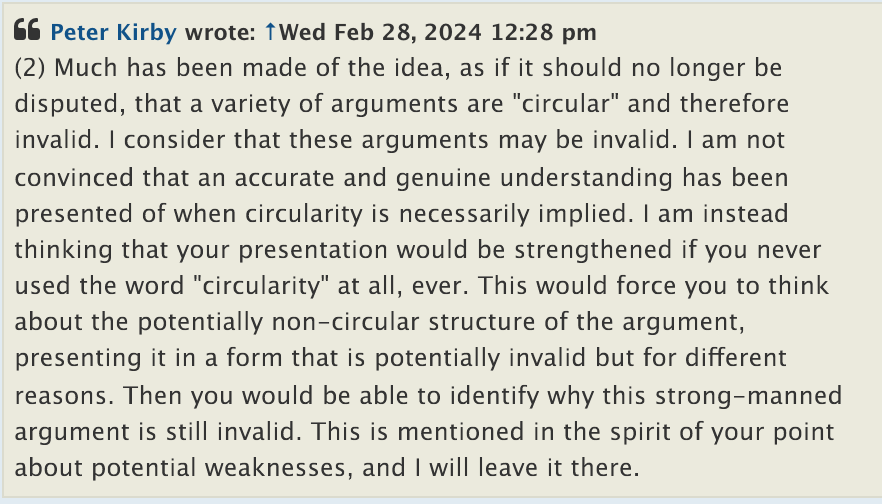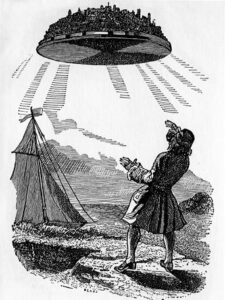So let’s resume my specific responses to criticisms raised on the earlywritings forum over the question of the Hellenistic era being the earliest setting for the Pentateuch and other books of the Bible. (I am posting my responses here after discovering that on that forum some of my responses were being removed without notice or explanation.)
I have now come to the moment when the moderator (Peter Kirby) of what was designated an Academic Discussion part of the forum entered. His initial post was lengthy and it took me quite a number of readings before I thought I understood the main points clearly enough before responding. But I’ll focus here on what was clear.


From that remark I assumed that the commenter must have known the arguments I was referring to and disagreed with the claim that they were circular. But in the course of the discussion I learned that he did not know what those arguments were and simply assumed I must have been falsely claiming they were circular. The fact that I had alluded to the critique of circularity itself came from scholarly criticisms was no doubt inadvertently overlooked.
I found myself in a confusing situation. Here I was being asked to reword arguments (that I later learned were unknown to the commenter) in such a way that they were no longer logically invalid.
In effect, the daunting challenge that I was being confronted with was this:
Take the following argument:
- The biblical narrative of King Josiah strongly indicates that Deuteronomy made its first appearance in the time of King Josiah
- We conclude this from the fact that the story of Josiah appears to have been written to prove to readers that King Josiah learned of the laws in Deuteronomy and proceeded to act on them. Many passages in the Book of Kings reflect Deuteronomistic language so it looks like Deuteronomy was a key text motivating the author of the story of King Josiah.
- Therefore we conclude that the author of the narrative had historical sources about these events and used them to create his narrative
- The narrative is therefore based on historical events that came to be known to the author although we concede that the author put his own spin on the events.
Now I was given a monumental challenge. I was being asked to accept that the above line of “logic” was not credible (to this much I agree!) — that I was being asked to grant that biblical scholarship would not be so crudely fallacious (to that I cannot agree, having seen so many, many instances of biblical scholarship arguments based on fallacies and ignorance) — and that I was being asked instead to find a way to re-present the arguments for Deuteronomy being known to Josiah in a way that was not circular.
If only I could inform readers of the arguments in a way that did not make them look fallacious!
Now I fully agree with the principle that one should always construct one’s opponents’ arguments in as strong a manner as possible before attempting to address them, but how does one rearrange a circle into a straight line and still claim one is addressing the original point?
And what should I make of countless scholarly volumes that at some point zero in on critiquing a logical fallacy (most commonly circularity) of arguments being bandied about in the field?
My dilemma was that I had read and analysed the arguments of the Documentary Hypothesis (or let’s keep it simple and limit it to the discussion of Josiah and the Book of Deuteronomy), AND I had read the observations of scholarly critics of those arguments, and now was being asked to create new arguments for Deuteronomy being known in the time of Josiah that were not circular.
I felt like I was being asked to perform a magic trick even though I knew I was not a magician. If the only arguments that have been presented in the literature are indeed circular, how could I re-word them so they would not be circular?
If such a challenge was coming from one of the well-known trolls on the site I would have brushed it aside. But the moderator had some kind of reputation for being reasonably knowledgeable and intelligent — and he even said he wanted me to take his criticism in the presumably well intentioned spirit in which it was offered.
I do have to give him credit, though. He really was kindly condescending enough to try to help me out and to get me to “be reasonable” and join his world in the land of Gulliver’s Laputans.
It took a little more discussion — one that devolved into where I found myself fending off a barrage of presumptuous psycho-analysis in which he attempted to persuade me to acknowledge my “hidden psychological identity needs” that were propelling me to make the arguments in the way I was — before it finally dawned on me that I had misguidedly been knocking on the gates of Laputa.
Thus it has ever been the way, has it not? Guardians will always be there to fiercely defend the defined limits of allowable discussion and criticism. And the weapon they will always pull out is the pop-psychological analysis, otherwise known more politely and generically as “ad hominem”.
